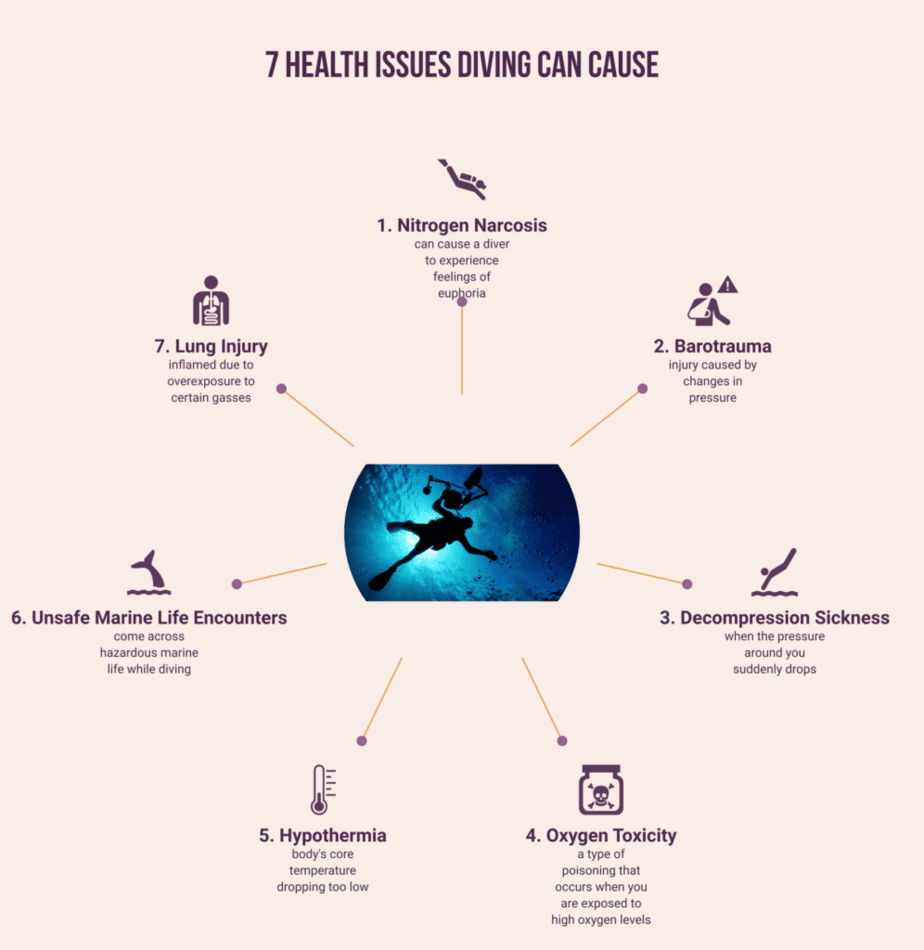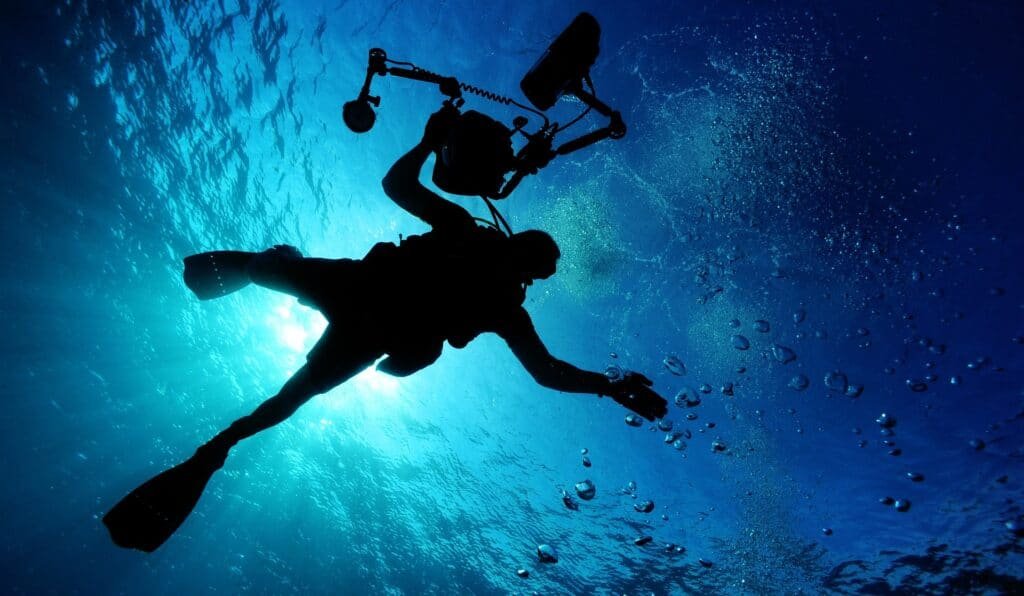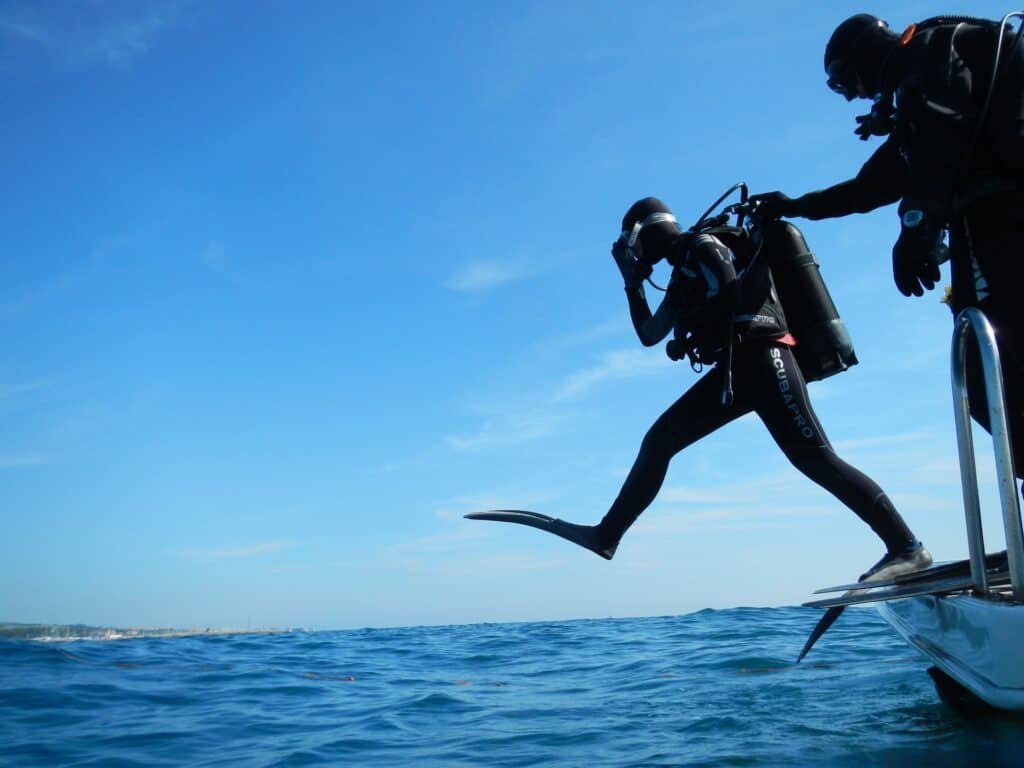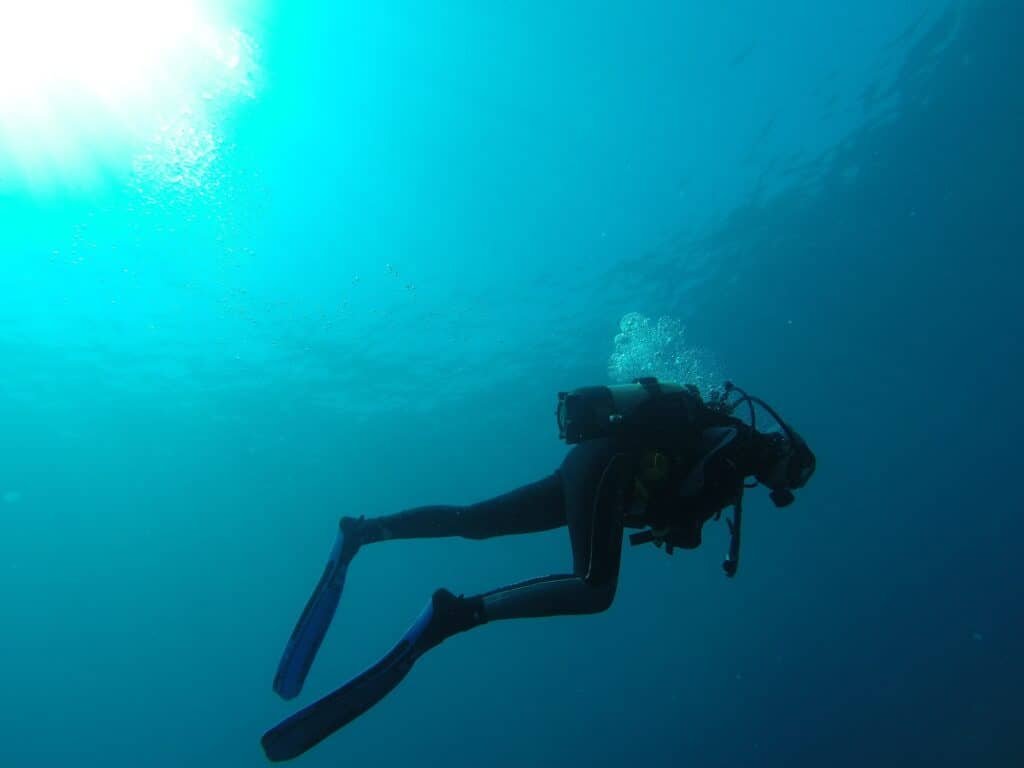Diving is an incredibly exciting pastime. It offers the opportunity to explore and discover the hidden depths of our oceans, rivers, lakes, and quarries. It’s not just a hobby—it can be a way of life! But with any exhilarating activity comes risk.
Discovering how scuba diving can affect your health might shock you! After all, swimming around underwater appears to be a healthy activity. But the truth is, this hobby comes with a variety of risks that need to be taken seriously and mitigated. From decompression sickness to nitrogen narcosis, these risks can create serious problems for divers.
This article will talk about the common health issues diving can cause. Therefore, you can make informed decisions when planning your dives.
7 Health Issues Diving Can Cause

1. Health Issues Diving Can Cause: Nitrogen Narcosis
Did you know that Nitrogen Narcosis is a very real and potentially debilitating health issue that can occur when engaging in deep-water diving? It’s sometimes referred to as the “rapture of the deep” or “martini effect” – due to how it makes one feel. But despite its catchy nicknames, it is no joking matter.
This peculiar condition can cause a diver to experience feelings of euphoria, impaired judgment, and disorientation when exposed to high nitrogen levels at depth. Nitrogen narcosis affects divers of all skill levels and is especially prevalent in deep-sea divers who dive beyond 130 feet.
So what is it exactly?
Well, it occurs when a diver breathes in the compressed air that contains higher nitrogen concentrations than found at the surface. At this depth, nitrogen becomes “accumulated” in the body and can cause various physiological changes. The mental effects are comparable to those of alcohol intoxication.
As with any underwater activity, safety should always be your top priority; this goes double for diving activities associated with potential risks like nitrogen narcosis. So how do you manage it safely?
First off, it’s important to recognize that deep dives come with a greater risk of experiencing symptoms due to the increased pressure on the body caused by diving deeper down into the water column.
Secondly, find yourself descending past 130ft while diving, proceed with caution, and monitor your body closely for signs of nitrous numbness or other symptoms such as fatigue and dizziness.
Finally, if you ever feel unsafe underwater, always have an experienced dive partner who understands the risks associated with deep dives.
2. Health Issues Diving Can Cause: Barotrauma
Barotrauma is an injury caused by changes in pressure. The pressure around a diver’s body increases as they go deeper into the water. This creates an imbalance between the air inside their body and the outside pressure – causing damage to tissues or organs. The most common symptoms of barotrauma are ear pain, sinus pain or popping, chest pain, and difficulty equalizing pressures between your ears, teeth, or jaw.
In mild cases of ear barotrauma, a diver may just experience some discomfort during descent or ascent. Yet, in severe cases, failure to receive treatment might result in permanent tissue damage and even death. To avoid this danger, divers need to take special precautions when they plunge into deep waters.
The most important way to prevent barotrauma is by gradually increasing pressure as you descend. This lets your body adapt slowly over time rather than suffering from sudden changes in pressure at once.
It’s also important for divers to be aware of how far down they are going and what kind of equipment they will need for that depth before diving down too deep without proper gear or protection. Finally, divers should always equalize their ears as they go deeper, preventing unequalized pressures from building up inside each ear.
3. Health Issues Diving Can Cause: Decompression Sickness

One of the most frequent health effects of scuba diving is the occurrence of decompression sickness (DCS), sometimes known as the bends or gas embolism, and air embolism. The phrase describes a condition when the pressure around you suddenly drops. Because your body absorbs more oxygen and nitrogen when you dive with compressed air, it typically happens while you’re scuba diving or deep-sea diving. The nitrogen is dissolved into the blood and stays there throughout the dive while your body consumes the oxygen.
The water pressure surrounding you reduces as you move closer to the surface. Nitrogen does not have time to leave your body during quick ascents, which causes bubbles to develop in your tissues and blood.
These microbubbles may damage your blood vessels, which may also obstruct regular blood flow. Joint and muscular pain, hearing loss, vomiting, loss of memory, confusion, and uncontrollable shaking are just a few diving sickness symptoms.
Even though decompression illness strikes at random, some variables may increase your risk of getting it, including;
- congenital disabilities affecting the heart muscle
- poor cardiovascular fitness
- alcohol or cigarette use
- being overweight with a high body fat percentage
- previous or ongoing injuries
- lung disease
- diving in cold water
- exhaustion
The symptoms of DCS might start to show up to 48 hours after the dive, and there are various stages of the condition. Certain situations can be extremely serious, even fatal. Take the required precautions before and after each dive, and talk to your doctor about your worries if you have any, especially if you have a medical condition or disease.
4. Health Issues Diving Can Cause: Oxygen Toxicity

is essentially a type of poisoning that occurs when you are exposed to high oxygen levels for a short period. This can happen while diving if the oxygen concentration in your air tank is too high. The effects include dizziness, confusion, twitching, nausea, and loss of consciousness – none of which are ideal if you’re underwater!
To prevent the onset of these symptoms, divers need to be aware of the maximum amount of oxygen they can be exposed to each dive. Generally speaking, this should not exceed 1.4-1.6 atmospheres absolute (ATA). In addition to this upper limit, any ascent from deeper depths must also be made slowly to further reduce the risk.
The presence of other gases like nitrogen or helium may contribute to increased levels too. Therefore, divers should watch for signs such as shallow breathing or skin discoloration before continuing with their dive – both are common indicators that something isn’t quite right regarding oxygen levels.
5. Health Issues Diving Can Cause: Hypothermia
It’s a medical condition caused by your body’s core temperature dropping too low, which can be dangerous while diving. The cold water means that you are losing heat to the environment faster than you can generate it, and if this continues for long enough, hypothermia will set in.
The main symptom of hypothermia is an overall feeling of coldness and shivering. Your core body temperature will drop to less than 95°F (35°C). If left untreated, the effects become more serious;
- uncontrollable shivering stops
- your breathing slows down
These symptoms can eventually lead to unconsciousness or even death. That’s why knowing how to prevent hypothermia when diving is so important.
One of the best ways to prevent getting too cold is by wearing adequate thermal protection layers while diving. This includes items like a hooded wetsuit or a dry suit with adequate insulation underneath. Choose gear based on the water temperatures; the colder it is outside—in both air and water—the more layers you need! Other preventive measures include:
- Keep yourself hydrated, so your body doesn’t lose heat faster than needed.
- Avoiding overexertion while swimming which could cause fatigue.
- Take regular breaks during dives before feeling chilled to take advantage of the natural heat generated by these breaks.
6. Health Issues Diving Can Cause: Unsafe Marine Life Encounters

There are several ways in which a diver can come across hazardous marine life while diving. A common scenario is being stung by jellyfish or other venomous creatures such as stonefish, scorpion fish, and sea snakes.
Other dangerous animals include sharks, moray eels, barracudas, and stingrays. Even seemingly harmless creatures like manta rays can cause harm if they feel threatened. In some cases, contact with coral reefs or sharp rocks on the ocean floor can also lead to accidents or injury.
The key to avoiding unsafe encounters is knowledge and preparation. Before going out into the water, divers should familiarize themselves with any local species that are particularly dangerous or venomous and take preventive measures such as wearing protective gear when needed.
It’s also important for divers to stay alert and aware of their surroundings while underwater and keep an eye out for hazardous wildlife. When interacting with potentially dangerous animals, it’s best to maintain a respectful distance to avoid aggravating them and inadvertently putting yourself at risk.
7. Health Issues Diving Can Cause: Lung Injury
Lung Injury is a medical condition in which the lungs become inflamed due to overexposure to certain gasses underwater. This condition can occur regardless of whether or not a diver is using breathing equipment.
When a person dives too deep into the water, their lungs are subjected to higher pressure levels than they are used to. This can cause microscopic tears in the alveoli, part of the respiratory system responsible for oxygen exchange between blood and lungs. These tears can lead to difficulty breathing, coughing up blood, and chest pain. In severe cases, a collapsed lung (pneumothorax) may result if air escapes from the lungs into the chest cavity.
While Lung Injury can be serious, there are ways to reduce the risk while diving. One important step is to ensure the diver always remains within their comfort zone when underwater – meaning they do not dive too deeply or stay down for extended periods if they start feeling uncomfortable or out of breath.
Additionally, divers should practice proper safety protocols, such as always going with a buddy and always having necessary safety equipment on hand. Finally, scuba divers should ensure their equipment is regularly inspected for any defects that could increase their risk of injury.
Medical Conditions That Can Stop You From Scuba Diving

Before engaging in any activities involving scuba diving equipment, it is important to check with a medical professional and ensure you are healthy enough to do so. Several medical conditions can stop an individual from safely scuba diving, such as the following;
Behavioral Health
Behavioral health is a term used to describe mental, emotional, and behavioral disorders affecting an individual. This includes diagnoses like clinical depression, anxiety disorders, post-traumatic stress disorder (PTSD), bipolar disorder, and many others.
These conditions can manifest in various physical symptoms and interfere with the process of scuba diving – which comes with its own set of complex regulations and safety protocols.
For example, someone with anxiety often experiences elevated heart rates as part of their panic response, making it unsafe to be underwater. Similarly, people living with severe depression or PTSD may not have the focus necessary to complete the various tasks associated with scuba diving safely.
On top of that, there are issues related to cognitive functioning, like memory loss or difficulty concentrating – both of which could prove fatal if not managed properly underwater.
Cardiovascular System
The heart is what keeps us alive and healthy, and any disruption in its functioning can lead to life-threatening ailments.
Coronary artery disease, which occurs when the arteries become narrowed due to plaque buildup from fatty acids or cholesterol, must be managed carefully, as an untreated problem can result in a heart attack while underwater. In addition, heart failure is another serious disease affecting how your heart pumps blood and can increase your risk of drowning if not monitored properly.
Another common health condition associated with scuba diving is high blood pressure. This can create a higher risk of stroke while participating in this adventurous activity and should be properly regulated before going below the surface.
Even more concerning are paroxysmal arrhythmias, irregular heartbeats caused by electrical disturbances resulting from pre-existing genetic defects or chemical imbalances in the body. These have been known to cause sudden cardiac arrest while partaking in dives.
Pulmonary
Most people are familiar with asthma, which is a lung-related issue caused by inflammation of the airways when certain triggers are present. However, asthma is only one type of pulmonary condition that can prevent someone from pursuing scuba diving activities.
Other common respiratory issues come in all shapes and sizes. In fact, many people have pulmonary conditions they don’t even know they have!
The main issue with any form of pulmonary condition is the increased risk of lung collapse when exposed to high air pressure. When divers descend, the air pressure around them increases dramatically. If there is an existing weakness in the lungs, like an infection or inflammation due to asthma or another respiratory disorder. Then it can adversely affect their overall diving experience. This could cause serious physical harm, such as an embolism (a life-threatening blockage in the blood vessels).
Furthermore, those who have severe asthma may require special consideration when diver training and certifications are being planned. Severe asthmatics may need to bring their own inhaler or other forms of treatment while underwater. Something that you must discuss with a doctor before any major dive takes place.
Metabolic and Endocrinological
Metabolic disorders, such as diabetes and hypoglycemia, can be particularly tricky when it comes to scuba diving. Because metabolic disorders involve the body’s ability to regulate blood sugar levels, they can be dangerous underwater, with limited oxygen availability and increased physical activity.
Hypoglycemia (low blood sugar) can also cause hazardous situations while scuba diving. Therefore, divers should check their blood sugar regularly while underwater.
Endocrinological issues can also be a risk factor for scuba diving. Endocrine glands like the thyroid produce hormones that regulate heart rate and metabolism, which are important factors for managing oxygen consumption and exertion levels during dives. Scuba divers who must take medications that affect endocrine function should consult with their doctor if they plan to go scuba diving to avoid any dangerous side effects from taking these drugs underwater.
Neurological
The list of neurological disorders that have been identified as potential risks for scuba includes epilepsy, migraines, and vertigo. In many cases, the risk is heightened due to medications taken to manage these conditions.
Some doctors may even suggest avoiding diving altogether for those who suffer from these diseases. People affected by multiple sclerosis (MS) or cerebral palsy (CP) are strongly advised against taking scuba dives due to balance issues that can be greatly exacerbated while underwater.
It’s important to remember that medical conditions should never stop you from living an active lifestyle. Just ensure that you understand what health risks might come with engaging in certain activities like scuba diving.
Speak with your doctor before booking excursions. Ensure they understand all details related to your medical history before deciding about safety and participation levels.
Frequently Asked Questions
Q: Is heart disease a risk factor for scuba diving?
The fact is that although people with a history of heart disease can still go scuba diving, they may have a higher risk of health complications while doing so. This is because while underwater, your body is under tremendous pressure, and your cardiovascular system has to work much harder than normal.
Your heart needs sufficient oxygen, which unfortunately gets reduced underwater due to the lower levels of oxygen saturated in the water. That’s why it’s extra important for divers who have heart conditions to get medical clearance from their doctor beforehand to ensure safety!
Q: What do you mean by arterial gas embolism?
Arterial gas embolism, also known as AGES, is an extremely serious medical condition that can prove to be fatal. It occurs when a bubble of air or other gas enters the bloodstream. This could happen in numerous ways, such as a deep scuba dive, decompression while flying in an airplane, anesthesia mishaps during surgery, and many more.
When this bubble enters the blood flow and reaches the heart, it instantly affects its normal functioning. Since the air bubble cannot be dissolved in the blood, it gets stuck within any body organ or clogs an artery. This obviously presents a problem for circulation as much-needed oxygen and nutrients become blocked from reaching cells and organs.
Q: How will mild decompression sickness go away?
The good news is that symptoms usually go away within 24 – 48 hours without treatment since our bodies have their own mechanisms for balancing out nitrogen levels. In more serious cases, however, it may require professional medical care to lessen the severity of symptoms like cramping and dizziness.
Q: What are the long-term effects of scuba diving?
Generally speaking, though, experienced divers report feeling more relaxed and energized after taking part in a dive. Other possible benefits include improved blood circulation, increased joint flexibility, and overall well-being. But studies suggest that certain aspects of scuba diving can potentially cause negative side effects, including joint pain or dizziness hours or even days after the dive. Furthermore, over-exposure to compressed air can also lead to long-term health issues such as decompression sickness, known commonly as ‘the bends.’
Q: Do spinal cord injuries from diving accidents ever heal?
Spinal cord injuries from diving accidents can often be serious, and there is no definitive answer for whether or not they will heal. It depends on the severity of the injury and the person getting injured, as each individual’s ability to heal is different. In some cases, with proper medical attention, physical therapy, and plenty of patience, spinal cord injuries may improve over time and regain some limited movement. However, in many instances, the spinal cord damage is too extensive to be healed. Even when recovery is possible, it usually requires a lengthy rehabilitation process. The damage level and potential recovery extent remain unpredictable even after full medical examination and treatment.
Final Words
While diving is incredibly fun and a great way to explore the deep sea, paying attention to your body during and after dives is important. Many things can go wrong with diving; for instance, there may be physical issues like an inner ear imbalance due to unequal amounts of pressure in the ears or symptoms from decompression sickness like joint pain. Ignoring your physical needs can have disastrous effects on your health.
That’s why divers should always dive responsibly and within their training level. Plus, ensure they are familiar with safety protocols before every dive! It’s also essential to respect the marine life you encounter while underwater: harmlessness is key. It might seem like a lot, but it’s worth it when you reap all of the benefits of scuba diving!
